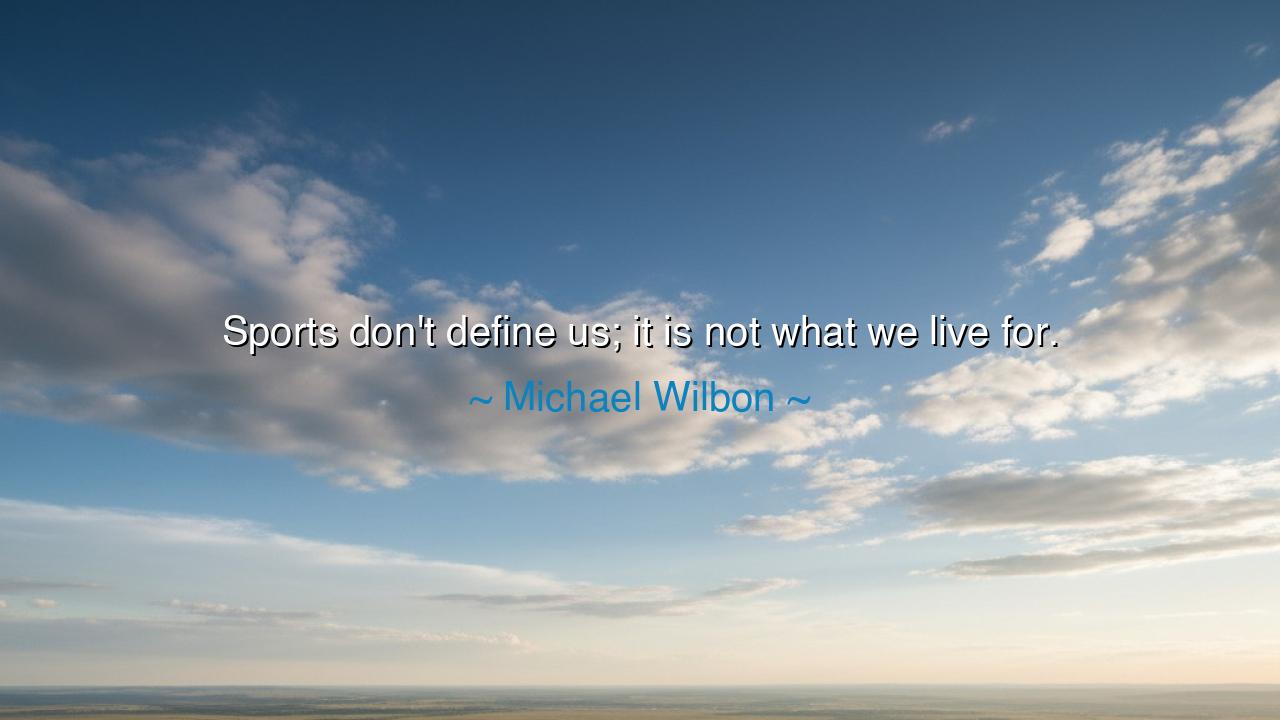
Sports don't define us; it is not what we live for.






Hearken, O seekers of truth, to the words of Michael Wilbon, who declared: “Sports don’t define us; it is not what we live for.” This is no rejection of play nor scorn of the arena, but a reminder spoken with the gravity of wisdom: that the contests of the field, though mighty in spectacle and stirring in spirit, are but reflections of greater things, not the essence of life itself. For man is more than his victories, more than his trophies, more than the cheers that echo in the stands. His being is rooted not in fleeting games, but in love, in duty, in the eternal bonds that bind soul to soul.
The ancients knew this truth well. The Greeks held their Olympians in honor, yet even they proclaimed that the crown of olive leaves would wither, while the crown of virtue endured beyond death. To be swift as Achilles or strong as Heracles was glorious, but to be just, to be wise, to be faithful—these defined the man more than any contest. So too does Wilbon remind us that sports, though wondrous and noble, are not the foundation of life but the adornment of it.
Consider the tale of Pat Tillman, a warrior of modern times. He played with valor in the National Football League, cheered by multitudes for his skill. Yet when the call of country and conscience stirred his soul after the tragedy of September 11th, he laid aside helmet and jersey, turning instead to the armor of a soldier. He walked away from wealth and fame, because he understood what Wilbon’s words declare: sports do not define us. Tillman’s life was not measured by yards gained on the field, but by the sacrifice he chose for a cause greater than himself. His story shines like a beacon, reminding us that the true measure of a man lies beyond the games he plays.
And yet, let us not despise sports. They are the training ground of discipline, the forge of teamwork, the song of the body in harmony with spirit. They inspire nations, heal divisions, and lift the hearts of the weary. But they are a mirror, not the flame; a path of practice, not the destination. To confuse the joy of the contest with the meaning of existence is to mistake the reflection of the moon in water for the sun itself.
Wilbon’s words call us back to the roots of life. What defines us is not the roar of the crowd but the quiet choices we make in the shadows. Not the record of games won, but the record of kindness shown. Not the medals we wear, but the integrity we bear. The ancient sages would say: sports train the body, but virtue trains the soul. And it is the soul, not the body, that endures beyond the finish line.
So let the lesson be this: cherish the games, but never worship them. Rejoice in victory, but never think it the crown of your existence. When you play, play with honor; when you watch, cheer with joy. Yet when the game ends, return to life’s true field: the raising of children, the building of communities, the pursuit of wisdom, the service of others. For these are the arenas that define the measure of a human life.
Practical is this counsel: remind yourself daily of what endures. Write not your worth in the ink of statistics, but in the hearts you uplift. Place family, friendship, and service above any pastime. If you are drawn to sport, let it sharpen you, but never let it consume you. If you admire athletes, let their discipline inspire your own journey toward purpose—but know that your life, like theirs, finds meaning not in the game, but in the life lived beyond it.
Thus, carry with you Wilbon’s truth: sports are a joy, but not our definition. They are a flame that warms the heart, but the fire of life burns elsewhere—in love, in justice, in sacrifice, in the eternal pursuit of what is good. Let us never mistake the arena for the kingdom, nor the game for the destiny of the soul.






AAdministratorAdministrator
Welcome, honored guests. Please leave a comment, we will respond soon